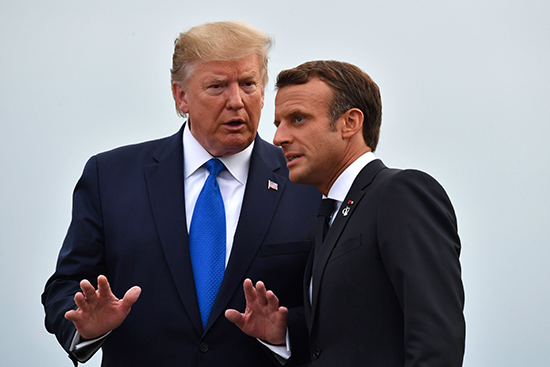G7峰會:幾家歡喜幾家愁

|
干了吧,紅酒愛好者們。舉起慶祝的酒杯,因為一些你所鐘愛的紅酒并沒有陷入特朗普總統(tǒng)發(fā)起的這場不斷擴(kuò)大的貿(mào)易戰(zhàn)。 然而,科技巨頭們可能只有袖手旁觀的份。 8月26日,G7峰會在其本土的比亞里茨剛剛閉幕,27日,法國紅酒行業(yè)很快便開始為“無稅”勝利而歡呼,雖然這種慶祝只是曇花一現(xiàn)。就在幾天前,事情看起來并不是很明朗,當(dāng)時,特朗普在新聞發(fā)布會上再次威脅對法國紅酒征收報復(fù)性關(guān)稅,除非法國政府放棄對科技巨頭征稅。 有關(guān)紅酒制造商不幸發(fā)現(xiàn)自己被卷入有關(guān)互聯(lián)網(wǎng)和科技公司稅收問題的事實,反映出了當(dāng)前全球貿(mào)易協(xié)定存在的不確定性。 科技公司稅收似乎引發(fā)了美國對其他法國產(chǎn)品報復(fù)性制裁,包括紅酒。美國官員和法國財政部長布魯諾·勒梅爾曾經(jīng)于本周末在法國就該問題達(dá)成了某種共識。勒梅爾向法國電視臺LCI透露:“在比亞里茨會晤之前,這個威脅是真實存在的,法國紅酒差點就遭遇關(guān)稅打擊。在比亞里茨會晤之后,這一威脅不復(fù)存在。” 法國葡萄架和烈酒出口行業(yè)協(xié)會FEVS(法國葡萄酒與烈酒出口聯(lián)盟)于8月27日在法國向記者發(fā)布了一則聲明,稱自己對紅酒制造商在峰會中逃過新稅一劫而感到“十分高興”,并對法美外交大唱贊歌,稱其“成功避免了一切阻礙國際貿(mào)易的行為,尤其是法國紅酒在美國市場的準(zhǔn)入問題,因此標(biāo)志著雙方在緩解貿(mào)易緊張局勢方面邁出了重要的一步”。 然而,代表科技行業(yè)的貿(mào)易團(tuán)體則抱怨說,美國談判者相當(dāng)于給馬克龍政府開了“綠燈”,因為其未能說服法國政府撤銷其科技公司征稅。 計算機(jī)與通訊行業(yè)協(xié)會會長兼首席執(zhí)行官艾德·布拉克在一則提供給《財富》雜志的聲明中說:“法國針對美國首要公司的單邊數(shù)字稅行動是不公平的,對這種行為的漠視將鼓勵其他國家效仿其做法。盡管我們存在眾多的疑問,而且也在等待更多的細(xì)節(jié)浮出水面,但在當(dāng)前看來,這個‘協(xié)議’更像是投降而不是妥協(xié)。” 確實,包括意大利和英國在內(nèi)的其他增速緩慢的G7成員國,正在密切觀望法國的數(shù)字稅,而且正謀劃推出自身的征稅方案。 對本土科技跨國公司數(shù)字業(yè)務(wù)征稅的勢頭在今后將不斷加大,而且正在朝經(jīng)合組織國家蔓延。這個在G7峰會外圍活動達(dá)成的原則性協(xié)議要求法國向科技公司發(fā)放某種課稅津貼,金額為法國稅收與經(jīng)合組織國家最終征收的任何稅收之間的差額。 法國對科技公司的征稅于上月生效,額度為法國公司數(shù)字業(yè)務(wù)營收額的3%。該稅種的門檻為全球數(shù)字業(yè)務(wù)營業(yè)額不低于7.5億歐元或法國數(shù)字業(yè)務(wù)營業(yè)額不低于2500萬歐元的任何企業(yè),廣告,電商和數(shù)據(jù)處理等行業(yè)均適用。當(dāng)?shù)匕堰@一稅種稱為GAFA,也就是預(yù)計受該政策沖擊的一些超大型公司的首字母縮寫:谷歌(Google)、亞馬遜(Amazon)、Facebook和蘋果(Apple)。 與此同時,法國紅酒制造商則在紛紛開瓶慶祝。該國132億歐元(約合147億美元)的紅酒行業(yè)是全世界最大的紅酒產(chǎn)業(yè)之一,而美國又是法國首要的出口市場。FEVS稱,在2019年上半年,法國向美國出口的紅酒和烈性酒達(dá)到了18億美元,接近去年全年的總額。(財富中文網(wǎng)) 譯者:馮豐 審校:夏林 |
Go ahead, vinophiles. Raise a celebratory glass knowing that some of your favorite wines haven’t yet been dragged into President Trump’s ever-expanding trade war. Big Tech though just might sit this one out. The French wine industry on August 27 was quick to hail a “no-tax” victory—even if it proves shortlived—a day after the G7 Summit wrapped up on its home turf in Biarritz. Things looked uncertain just a few days ago when Trump, in a press conference, once again threatened a retaliatory tariff on French wine unless the French government backed off taxing tech giants. That winemakers even found themselves embroiled in a dispute over a tax on Internet and technology companies speaks volumes about the uncertainty of global trade pacts these days. Once in France this weekend, U.S. officials and French Finance Minister Bruno Le Maire achieved a kind of détente on the tech tax that seems to knock off the table retributive sanctions on other French products, including wine. “Before Biarritz, the threat was real, we were close to getting hit with a tariff on French wine,” Le Maire told French TV station LCI. “After Biarritz the threat has receded.” France’s wine and spirits export body (FEVS) issued a statement in French on August 27 to journalists that it was “delighted” its winemakers survived the summit with no new tax constraints. It praised the Franco-American diplomacy, making “it possible to avoid any action hindering international trade, in particular the access of French wines to the American market, and thus marks an important step towards reducing trade tensions,” according to the statement. A trade group representing the technology industry, however, grumbled that American negotiators gave the Macron government the equivalent of a “free pass” in failing to convince it to rescind the levy. “France’s unilateral digital tax action aimed at leading American companies is unjustified, and if tolerated, will encourage other countries to follow their example,” said Ed Black, President & CEO of the Computer & Communications Industry Association, in a statement shared with Fortune. “While we have many questions and await more details, it currently appears that this ‘a(chǎn)greement’ would be more capitulation than compromise.” Sure enough, other slow-growing G7 members, including Italy and the United Kingdom, are watching the French digital tax closely with designs on ratifying a version of their own. The future of taxing the domestic digital businesses of tech multinationals is gaining momentum and heading for the OECD. The agreement reached in principle on the sidelines of the G7 summit calls for France to issue a kind of tax credit to tech companies for the difference between the French tax and any levy ultimately drawn up by the OECD. France’s levy on tech companies went into effect last month. It imposes a 3% tax on companies’ digital revenues in France. It applies to any company that makes at least €750 million globally and €25 million in France from digital business whether it be advertising, e-commerce or data handling. The levy is known locally as GAFA, an acronym for the biggest of the companies expected to be impacted by the new measure: Google, Amazon, Facebook and Apple. Meanwhile, French winemakers were popping corks. The country’s 13.2 billion euro ($14.7 billion) wine sector is one of the biggest in the world, and the U.S. is France’s leading export market. According to FEVS, in the first half of 2019, exports of French wines and spirits to the United States reached € 1.8 billion, on pace to surpass last year’s haul. |













